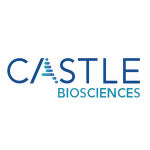Welcome to our dedicated page for Castle Biosciences news (Ticker: CSTL), a resource for investors and traders seeking the latest updates and insights on Castle Biosciences stock.
Castle Biosciences, Inc. (Nasdaq: CSTL) is a diagnostics company focused on molecular tests that guide patient care in dermatologic and gastroenterological disease. The CSTL news feed highlights company announcements, clinical data, financial results and corporate updates that shape how investors and clinicians view its role in precision medicine.
Readers can follow news on Castle’s core test portfolio, including DecisionDx-Melanoma for cutaneous melanoma, TissueCypher Barrett’s Esophagus, DecisionDx-SCC for high-risk cutaneous squamous cell carcinoma, MyPath Melanoma and its suite of tests for uveal melanoma such as DecisionDx-UM, DecisionDx-PRAME and DecisionDx-UMSeq. Coverage also includes updates on AdvanceAD-Tx, the company’s gene expression profile test designed to guide systemic treatment decisions in moderate-to-severe atopic dermatitis.
In addition to product and clinical evidence updates, CSTL news items feature quarterly and annual financial results, test volume trends for core revenue drivers, and guidance ranges reported in earnings releases. Regulatory and corporate governance developments, such as bylaw amendments disclosed in Form 8-K filings, as well as participation in healthcare and investor conferences, are also common topics.
Because Castle Biosciences emphasizes rigorous clinical validation, many news releases center on new studies, meta-analyses and expert consensus papers that evaluate the performance of its tests in real-world and prospective cohorts. These articles provide insight into how DecisionDx-Melanoma, TissueCypher and other assays are being integrated into clinical decision-making.
For investors, clinicians and researchers tracking CSTL, this news page offers a centralized view of earnings announcements, product launches, reimbursement developments, clinical data presentations and corporate events related to Castle Biosciences’ molecular diagnostics business.
Castle Biosciences (CSTL) will present at Baird’s 2022 Global Healthcare Conference on Sept. 13, 2022, at 2:00 p.m. ET. The presentation, led by CEO Derek Maetzold and CFO Frank Stokes, will be available via a live audio webcast on their website, with a replay for 90 days. Additionally, they will participate in one-on-one investor meetings at the Lake Street Best Ideas Growth Conference on Sept. 14, 2022. Castle is focused on diagnostics for conditions like skin cancers and Barrett’s esophagus.
Castle Biosciences, Inc. (CSTL) will host an Investor Day on Sept. 20, 2022, from 4:00 p.m. to 6:30 p.m. EDT, featuring insights on corporate strategy, growth plans, and financial outlook. Key executives, including
Castle Biosciences (CSTL) reported a 53% increase in Q2 2022 revenue to $34.8 million, alongside a 57% rise in total test reports delivered. The firm raised its full-year revenue guidance to $130–135 million. Key test volumes included 7,125 DecisionDx-Melanoma reports, up 39%, and 1,344 DecisionDx-SCC reports, up 71%. Despite positive revenue growth, net loss for Q2 was $(1.6) million, an improvement from $(8.8) million in 2021. Cash and equivalents stood at $273 million as of June 30, 2022.
Castle Biosciences (NASDAQ: CSTL) announced that the American Gastroenterological Association recognizes its TissueCypher® Barrett’s Esophagus test as beneficial for risk stratification in patients with non-dysplastic Barrett’s esophagus. This test aims to predict progression to high-grade dysplasia (HGD) and esophageal adenocarcinoma (EAC). The AGA's best practice advice highlights the potential of TissueCypher to enhance clinical decision-making, identifying high-risk patients who may benefit from tailored treatment plans. This represents a significant advancement in managing Barrett’s esophagus.
Castle Biosciences (NASDAQ: CSTL) is set to present a company overview at the Canaccord Genuity 42nd Annual Growth Conference on August 10, 2022, at 1:00 p.m. Eastern time. The presentation will be led by
Castle Biosciences, Inc. (CSTL) will release its financial results for Q2 and six months ending June 30, 2022, after market close on August 8, 2022. A conference call to discuss the results is scheduled for 4:30 p.m. Eastern Time on the same day. The webcast will be available on the company's Investor Relations page. Castle specializes in diagnostics, focusing on innovative tests for skin cancers and other conditions, with ongoing research in new test developments.
Castle Biosciences (NASDAQ: CSTL) announces a milestone of over 100,000 orders for its DecisionDx-Melanoma test. This test assists in guiding treatment decisions for patients diagnosed with cutaneous melanoma. Since its launch, more than 105,000 tests have been ordered by over 10,200 providers. The test's clinical utility is backed by over 35 peer-reviewed publications and has shown a 27% improvement in melanoma-specific survival in recent studies. The company's commitment to transforming patient care continues to drive its innovations in diagnostics.
Castle Biosciences (NASDAQ: CSTL) announced a presentation on its DecisionDx-Melanoma test at the 2022 American Academy of Dermatology Innovation Academy in Vancouver, Canada, from July 21-24. The test assesses individual risk for sentinel lymph node positivity and melanoma recurrence using a 31-gene expression profile. Dr. Aaron Farberg will discuss how this test aids in decision-making and improves patient outcomes. Over 97,288 tests have been ordered as of March 31, 2022, showing significant engagement and validation in melanoma management.
Summary not available.
Castle Biosciences (Nasdaq: CSTL) reported findings from a study on uveal melanoma patients' attitudes towards prognostic testing with DecisionDx-UM. The research, presented at the 20th International Society of Ocular Oncology congress, showed that 90% of 177 surveyed patients desired prognostic information at diagnosis. Notably, there was no significant difference in decision regret among varying risk classifications (Class 1A, 1B, Class 2). Patients appreciated the insights gained from the test, including better understanding of their disease and personalized treatment options.

